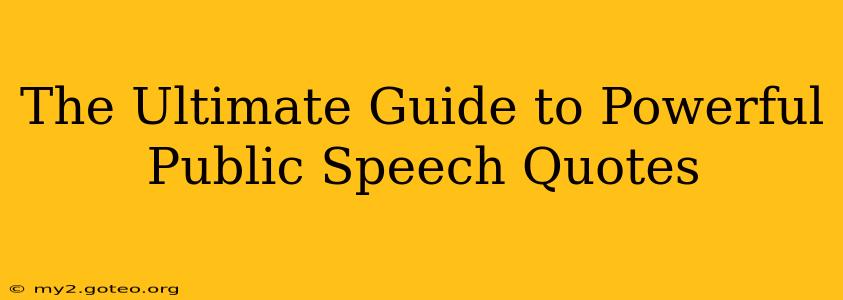Public speaking is an art, and like any art form, it's greatly enhanced by the skillful use of impactful quotes. A well-chosen quote can resonate deeply with an audience, adding weight, credibility, and memorability to your message. This guide delves into the power of quotes in public speaking, exploring how to select, integrate, and deliver them effectively.
Why Use Quotes in Public Speaking?
Quotes serve several crucial purposes in public speaking:
- Enhance Credibility: Quoting respected figures lends authority and believability to your arguments. The wisdom of others supports your own points, making your message more persuasive.
- Evoke Emotion: Carefully chosen quotes can tap into the audience's emotions, creating a more powerful connection and fostering empathy.
- Add Variety and Interest: Quotes break the monotony of your own voice and delivery, keeping the audience engaged and preventing listener fatigue.
- Illustrate Complex Ideas: Sometimes, a quote can express a complex concept more succinctly and memorably than you could in your own words.
- Memorable Takeaways: Quotes stick in people's minds. A well-placed quote can become a lasting impression from your speech.
How to Choose the Right Quotes for Your Speech
Selecting the perfect quote isn't about finding the most famous one; it's about finding the most relevant one. Consider these factors:
- Relevance to your topic: The quote must directly relate to the central theme and supporting points of your speech.
- Audience appropriateness: Consider your audience's background, interests, and values when selecting a quote. What resonates with one group might fall flat with another.
- Source credibility: Choose quotes from trustworthy and respected sources whose authority will enhance your message.
- Brevity and impact: Shorter, punchier quotes are generally more effective than long, rambling ones. The quote should stand out and be easily remembered.
- Originality and Uniqueness: While classic quotes have their place, strive for originality. A less-known but highly relevant quote can be surprisingly impactful.
How to Integrate Quotes Seamlessly into Your Speech
Simply dropping a quote into your speech won't guarantee its effectiveness. Here's how to integrate quotes smoothly:
- Introduce the quote: Don't just throw it in. Briefly introduce the quote and its source, providing context for your audience.
- Explain the relevance: After the quote, take a moment to explain how it supports your argument or illustrates your point. Don't leave the audience to make the connection on their own.
- Relate it back to your main points: Clearly connect the quote to your overall message, reinforcing the key takeaways of your speech.
- Use varied delivery: Don't simply read the quote monotonously. Adjust your tone and pacing to match the mood and meaning of the quote.
What are some examples of powerful public speaking quotes?
This depends heavily on the context of your speech! However, here are a few examples across different themes, demonstrating the diversity of choices:
- Motivation: "The only way to do great work is to love what you do." – Steve Jobs
- Resilience: "The difference between ordinary and extraordinary is that little extra." – Jimmy Johnson
- Leadership: "The best leaders are those who serve." – Robert K. Greenleaf
- Innovation: "The future belongs to those who believe in the beauty of their dreams." – Eleanor Roosevelt
- Collaboration: "Alone we can do so little; together we can do so much." – Helen Keller
Remember, the most effective quote is the one that best serves your speech and connects most powerfully with your audience.
How do I find the perfect quote for my speech?
Finding the right quote takes time and research. Here are some helpful resources:
- Quotation websites: Websites like Goodreads and BrainyQuote offer vast collections of quotes organized by topic, author, and theme.
- Books and articles: Read widely on topics related to your speech; inspirational quotes often emerge from unexpected sources.
- Interviews and speeches: Watch and listen to speeches and interviews of influential figures; they often contain memorable quotes.
How can I make a quote more memorable in my speech?
Beyond choosing a powerful quote, consider these techniques to enhance memorability:
- Use visual aids: Pair a particularly impactful quote with a relevant image or graphic to enhance its impact.
- Incorporate repetition: Subtly repeat key words or phrases from the quote throughout your speech.
- Use storytelling: Embed the quote within a compelling anecdote or story to increase engagement.
- Emotional delivery: Deliver the quote with feeling and passion to help the audience connect with its meaning.
This guide provides a comprehensive starting point for harnessing the power of quotes in your public speaking. Remember that effective quote usage requires careful selection, thoughtful integration, and skillful delivery. By thoughtfully incorporating quotes, you can elevate your speeches, resonate with your audience, and leave a lasting impression.

